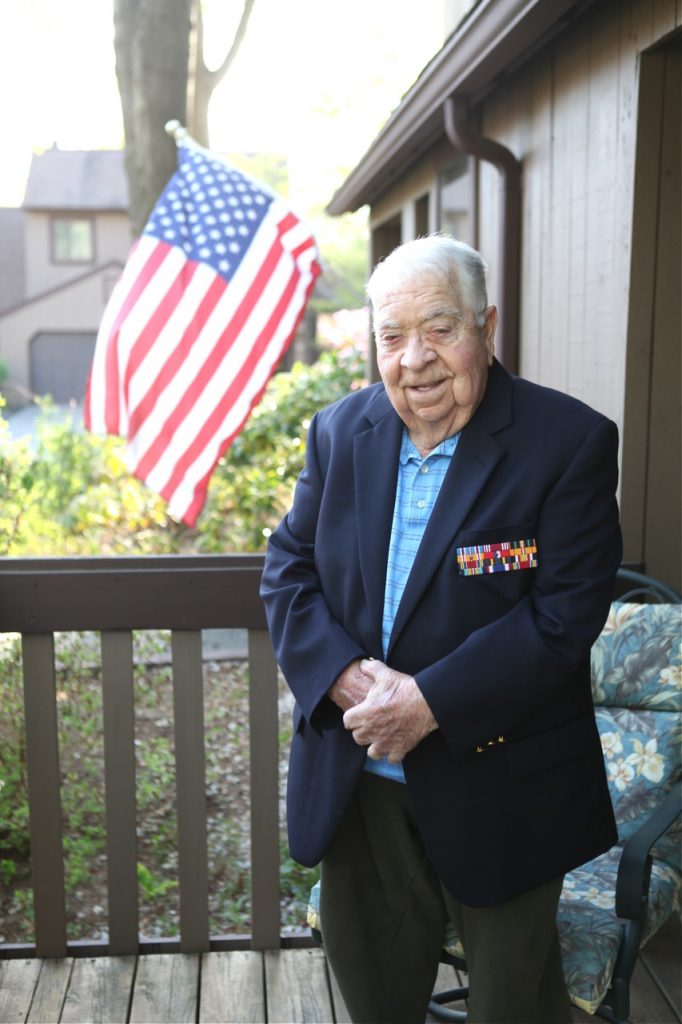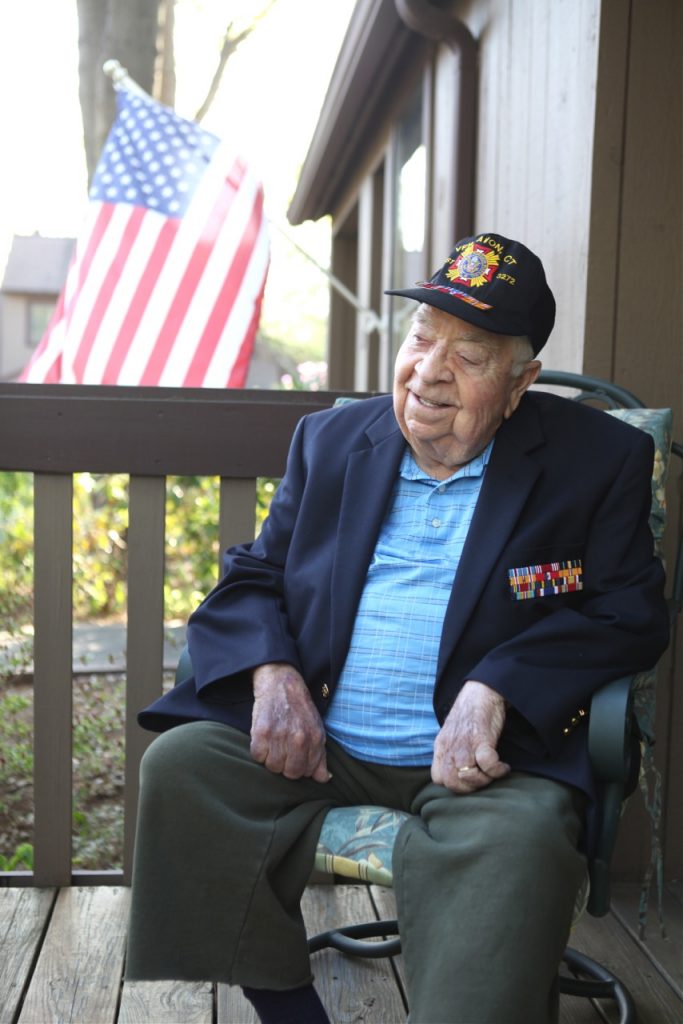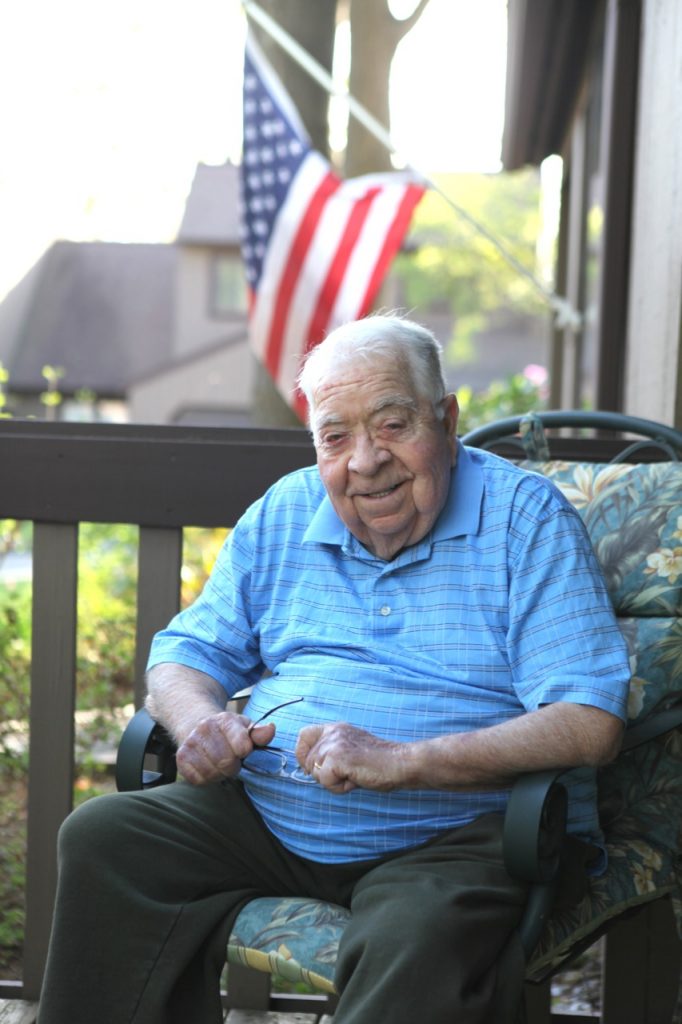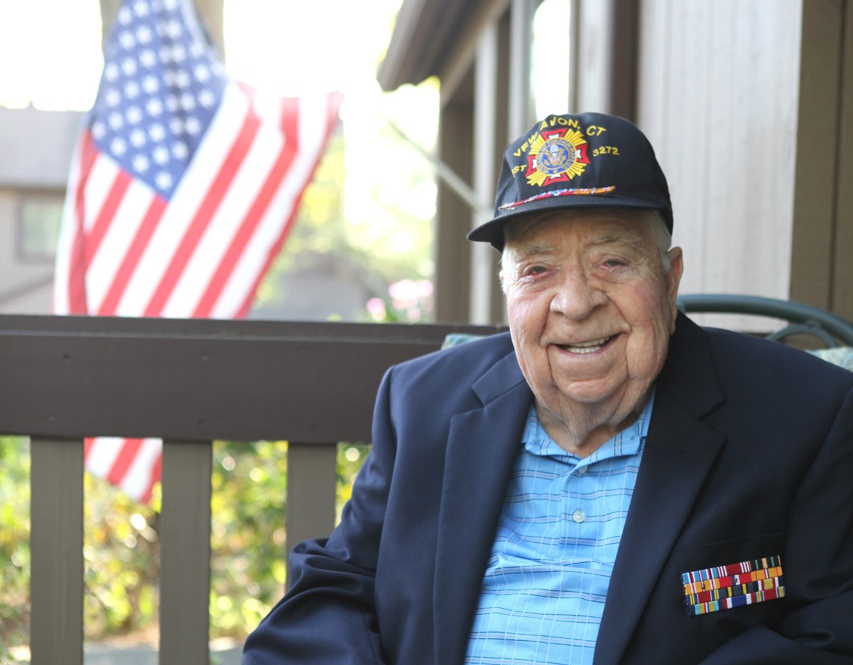This summer marks the 70th anniversary of the end of World War II. Waged in Europe, Africa and Asia beginning in the 1930s, it was a war in which most Americans did not want to get involved, at first. During the 30s, the U.S. suffered through a terrible economic era, which came to be known as the Great Depression. Most Americans believed that the U.S. should work on solving its own problems and not get involved in other countries’ troubles. In 1941, however, when Japan attacked the U.S. territory of Hawaii, American isolationism transformed instantly into a nationwide feeling of patriotism and determination to fight and win the war against the Axis Powers – Japan, Germany, and Italy.

After years of war, the U.S., British and Soviet-led Allied Powers defeated the enemy in Europe in May of 1945, with the surrender of Germany. In August of 1945, Japan finally stopped fighting and formally surrendered in September after enduring much defeat and devastation, including being attacked by the U.S. with a fierce firebombing campaign and two atomic bombs. Seventy years later, Clayton (“Bill”) Cooke, of Avon, vividly recalls the Great Depression, Pearl Harbor, and his service as a Staff Sergeant in the U.S. Army, first as a guard at a secret intelligence base outside of Washington, D.C. and then as a communications technician in the Philippines.
Cooke’s father owned a nightclub called the Sunset Palace on Bantam Lake in Morris, Connecticut. When Cooke was a small boy, just as the Roaring 20s was devolving into the Great Depression, he helped his dad at the club on Saturday nights. The club girls in the 20s were known as “flappers,” and Cooke watched them dance with their friends to live jazz music.
Cooke attended class in a one-room schoolhouse in Morris, and while his fellow students brought lettuce sandwiches for lunch, he packed chicken from the Sunset Palace. People didn’t have much money for food during the Depression, so they ate from their gardens. Cooke traded his chicken sandwiches for the lettuce sandwiches he preferred, and the other children were happy to have something as expensive as chicken to eat.
As the Depression wore on, flamboyant flapper parties grew out of style, and Cooke’s father gave up the roadhouse and moved his family to West Hartford. He took a job with the Railway Express Agency, the FedEx®of its day, and felt fortunate to have decent work.
By late 1941, the weight of the Depression was lifting as the U.S. had begun manufacturing war equipment for England and for the U.S.’s national defense. The battles overseas dominated the news in the U.S. — footage of bombed-out cities was shown in the newsreels at the movies — but war was far from home.
Americans finally had some money to spend and were looking forward to the holidays. Some Americans began to notice press reports of increased Japanese military activity in the Pacific Ocean, but most people, if they thought about it, dismissed Japan as a small country capable of little more than manufacturing cheap tin toys, knock-offs of superior, American-made goods.
Several days after Thanksgiving, on Sunday, December 7, 1941, Americans were enjoying the beginning of the holiday season. Towns and cities were decorated for Christmas. People gathered for special Sunday dinners with their families and went on “Sunday drives” in enormous cars. Friends chipped in for gas that cost, as Cooke recalls, about ten cents a gallon.
Cooke, a senior at Hall High School, was enjoying a typical, December Sunday at home. He, his two brothers, and their father were in their living room reading the big Sunday newspaper, the Hartford Times. The Cookes were gathered around their radio, a beautiful piece of furniture, listening to programs as they looked at the paper.
Suddenly, at 2:30 p.m., Eastern Standard Time, the major radio networks interrupted regular programming for a special news bulletin. Japan had attacked the U.S. Naval base at Pearl Harbor in Hawaii. Cooke, the eldest of the three brothers, was on the living room floor reading the funny papers, and he couldn’t believe his ears. The attack was still in progress. The Japanese were bombing Americans.
All across the country, stunned and saddened Americans sat by their radios with their families and friends and listened as details of the attack unfolded. More than 3,000 Americans had been killed or wounded. Some people burst into tears when they heard the news. This surely meant that America would go to war. Countless people uttered the words, “Our lives will never be the same.” People at movies, shops and football games sought the safety of home.

Many Americans consulted their atlas or encyclopedia to locate Pearl Harbor – most had never heard of it. Cooke was astonished by the radio reports of the losses the U.S. endured. He soon learned that most of the U.S. Navy’s fleet was at Pearl Harbor. The U.S. government, struggling diplomatically with Japan and wary of the country’s increased military presence in the Pacific, had stationed most of the U.S. Naval fleet at Pearl Harbor as a show of strength.
Never in a million years did Cooke think that he would end up fighting in the Pacific, but he did. Cooke was 17 years old in 1941, and like many other boys in the U.S., he was about to become a soldier and grow up fast. When he turned 18, he registered with his local draft board, as required by law.
Several months later, Cooke received a letter ordering him to report immediately for Army duty. Three days later he said goodbye to his family. He went to Fort Devens in Massachusetts where he was processed into the Army and given uniforms; his civilian clothes were shipped home, and he headed off to North Carolina for training. Next, Cooke was assigned to work with the Military Police at a top-secret military base outside of Washington D.C.
The U.S. interrogated German prisoners at the base, which was known only as P.O. Box 1142 and was demolished after the war. Information about the base remained classified for decades, and the people who worked there had been sworn to secrecy. As a result, not much is known about P.O. Box 1142. Cooke, who worked as a guard at the prison, is one of the few who can give a first-hand account of it.
The intelligence gathered at P.O. Box 1142 was critical to the Allied war effort and even to the Cold War and Space Race that followed World War II. During the World War II era, the Germans’ scientific and technological prowess was fearsome, regarded as the best in the world, particularly in the fields of submarines and rocketry.
Most of the interrogators at P.O. Box 1142 were German-trained scientists; many were Jewish and had immigrated to America as the Nazis began brutalizing the Jewish population. The U.S. Army drafted these German-Americans to interrogate German prisoners because they could put the prisoners at ease. They used various ploys to get information; sometimes, they instigated arguments between prisoners of different ranks. Physical force was never used.
Cooke’s favorite intelligence technique was a simple one. When prisoners refused to talk, the intelligence officers would dress them up in U.S. officers’ uniforms and take them out on the town. They encouraged them to eat, drink and do whatever they wanted. Invariably, the prisoners would relax and start talking. The U.S. officers, who would only pretend to drink, got the information they needed.
Early in the war, when Cooke was at P.O. Box 1142, interrogators sought information about Germany’s submarine (U-boat) technology and strategy because German U-boats were overpowering England in the Battle of the Atlantic Ocean. The intelligence gathered about U-boats at P.O. Box 1142 was crucial to the Allies’ success in that battle, which British Prime Minister Winston Churchill described as the most important of the war.
 Cooke was transferred out of the intelligence base in late 1944 and trained in communications so that he could serve in the Pacific Theater of the War. In February of 1945, the U.S. began the fight to liberate the Philippines from Japanese occupation. As a part of the campaign in which Pearl Harbor was attacked, Japan had taken over the Philippines, forcing U.S. General Douglas MacArthur, who commanded the Filipino Army, to retreat to Australia with his some of his forces. This was a terrible defeat for MacArthur, a legendary World War I hero, who, as he retreated, promised, “I shall return,” to free the people of the Philippines from Japanese control. Cooke helped MacArthur keep his famous promise.
Cooke was transferred out of the intelligence base in late 1944 and trained in communications so that he could serve in the Pacific Theater of the War. In February of 1945, the U.S. began the fight to liberate the Philippines from Japanese occupation. As a part of the campaign in which Pearl Harbor was attacked, Japan had taken over the Philippines, forcing U.S. General Douglas MacArthur, who commanded the Filipino Army, to retreat to Australia with his some of his forces. This was a terrible defeat for MacArthur, a legendary World War I hero, who, as he retreated, promised, “I shall return,” to free the people of the Philippines from Japanese control. Cooke helped MacArthur keep his famous promise.
The night Cooke arrived in Manila, in April of 1945, he heard the sound of gunshots, and saw the bodies of dead Japanese soldiers on the roads, in buildings and even in an elevator shaft. The Battle of Manila had been fought in February and March of 1945, and the U.S. defeated the Japanese there just before Cooke arrived. With the U.S. victory, the city was declared liberated from Japanese occupation, but it was still very dangerous. The Japanese were no longer officially fighting, but many Japanese snipers hid in the jungle trying to take out U.S. soldiers. Eventually, U.S. troops eliminated all the stray snipers, and the island was safe. A couple of months after Cooke arrived, in August of 1945, the war ended. Cooke served in Manila until February of 1946 to help rebuild the bombed-out island. He returned home much more worldly than the boy who had been reading the funny papers on December 7, 1941.
Cooke has an interesting postscript to his work at P.O. Box 1142. Soon after Cooke left the base, the U.S. had gathered enough intelligence to blast away much of Germany’s U-boat forces in the Atlantic.
The secret base then started to focus on interrogating top German scientists whom the U.S. had captured and brought to the prison. One prisoner was interrogated about his expertise in purifying uranium, which helped the U.S. develop its nuclear arsenal. Wehr- ner von Braun, who would go on to be known as the father of rocket science, was interrogated there as well.
After the war, many German scientists immigrated to the U.S. as a part of a U.S. program known as Operation Paperclip. Von Braun immigrated and went on to work for the U.S. Army’s rocket program. Coincidentally, Cooke himself enjoyed a very successful career in the aerospace industry. Many times Cooke’s German clients would meet with Cooke at his company’s headquarters in Alabama and then go off to the Army base near Huntsville to visit von Braun, former prisoner of P.O. Box 1142.
Cooke married his wife Evelyn in 1951 and together they raised two daughters, Judy Ann and Mary-Beth. It was “a devastating blow,” Cooke says, when his wife died after 60 years of marriage.
Now 92, Cooke lives in Avon and paints beautiful tributes to the works of Norman Rockwell. Cooke’s stories about his war service are not unlike a Rockwell painting — patriotic to the core but always laced with a bit of sweet humor. He remembers being envious that the German prisoners got to go “out on the town” so interrogators could get them talking: “I was eighteen years old, working as a guard, and these prisoners were out having fun.” He also ran into a bit of trouble while out joy riding with Filipino friends after the war ended. A buddy at the motor pool got him out of the jam, and Cooke repaid him by giving him his monthly allotment of cigarettes, which Cooke, a non-smoker, normally used for trade. “I was a little bit of a hell raiser back then,” he admits with a smile, “but I did get my Good Conduct Medal.”
Additionally, Cooke received the Victory Medal, the Asiatic Pacific Theater Campaign Ribbon, the American Theater Campaign Ribbon and the Philippine Liberation Ribbon with Bronze Service Star. The Philippine government presented him with the Philippine Liberation Medal and the Philippine Republic Presidential Unit Citation. Cooke also received a Certificate of Appreciation from the National World War II Memorial in Washington, D.C.
Theresa Anzaldua, of Farmington, is the author of We Had a Job to Do – A Basic History of World War II Through the Eyes of Those Who Served. The book is available at Harvard.com and on Amazon. Her mother, Mary Crumpler, served in World II in the Women’s Army Corps.
Photographer Todd Fairchild is Clayton Cooke’s son-in-law.







More Stories
Autism Families CONNECTicut Steps Up for the Local Community Building a Nonprofit From the Ground Up
Hospital for Special Care’s Ivan Lendl Adaptive Sports Camp
Special Olympics Connecticut: Supporting and Inspiring a Special Community